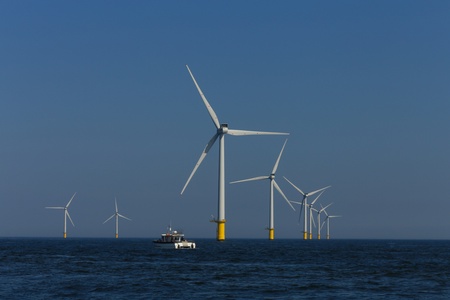Scientists from the University of Aberdeen (UoA) and North Highland College's Environmental Research Institute, part of the University of the Highlands and Islands, will lead a new project to determine where offshore wind developments should be located in order to better protect marine life in the future.
The three-year project, PREDICT (Predicting seasonal movement of marine top predators using fish migration routes and autonomous platforms) has received £800K funding from Ørsted, the global leader in offshore wind, and is a collaboration between the University of Aberdeen and North Highland College UHI’s Environmental Research Institute.
The research will address knowledge gaps in offshore wind environmental characterisation, by improving understanding of fish migration patterns and providing a vision for next-generation monitoring techniques.
Led by Professor Beth Scott (UoA) and Dr Benjamin Williamson (Environmental Research Institute), the PREDICT project will see scientists working closely with industry across a range of multi-disciplinary research themes, spanning ecology, engineering and data analysis. The project will investigate fish migration and how predictions of oceanographic changes to productive regions in time and space may be impacted by climate change, and knock-on effects on top predators (seabirds and marine mammals). PREDICT will support and accelerate development of strategic prediction, survey and analysis methods, so that industry can avoid using locations that have a higher likelihood of overlap with important feeding grounds for seabirds and marine mammals for offshore wind developments now and into the future.
Professor Beth Scott said: “This is a very exciting project that brings a proactive approach to determining the reasons why some locations in our seas may be safer to use for wind farm developments than others. The project will dive straight into the ecological mechanisms that make fish available as prey to seabirds and mammals such that we can better predict where mobile animals will choose to forage now and into a future driven by climate change. It is highly significant to see Ørsted encouraging and supporting such strategic science for the good of the entire sector.”
Dr Benjamin Williamson added: “As well as expanding our knowledge of prey availability, and the environmental and oceanographic factors which drive variability in marine habitats, this multi-disciplinary project will also evaluate innovative technologies to collect these datasets. As part of this, we are seeking a postdoctoral Research Fellow to join the team and investigate next-generation technologies for hydroacoustic and coordinated measurement.
This is a unique opportunity for a talented marine sensing, engineering or hydroacoustic researcher to explore optimal combinations of novel sensor platforms to collect data on environmental drivers, oceanographic variation in habitats, and prey (fish), to inform assessment of seabirds and marine mammals. Interested candidates can find more information here.
Duncan Clark, Head of UK Region for Ørsted says: “As the industry works hard to deliver the installed offshore wind capacity needed to hit Scotland’s net zero targets over the coming decades, it is essential that we do this in a way that is in balance with nature.
“The PREDICT project will provide essential research to ensure that offshore wind projects can achieve this, minimising the impact future developments might have on seabirds and marine mammals. We are proud to contribute to this project to be led by the University of Aberdeen and the Environmental Research Institute, which are recognised around the world for their extensive expertise in offshore renewable energy research.
“At Ørsted we have committed to deliver net-positive biodiversity impact in all renewable energy projects the company commissions from 2030, which means we will implement initiatives that support natural ecosystems, habitats, and species in and around our new renewable energy projects.”
The project will begin in October 2021, recruitment is currently underway for a Research Fellow to work on the project.


